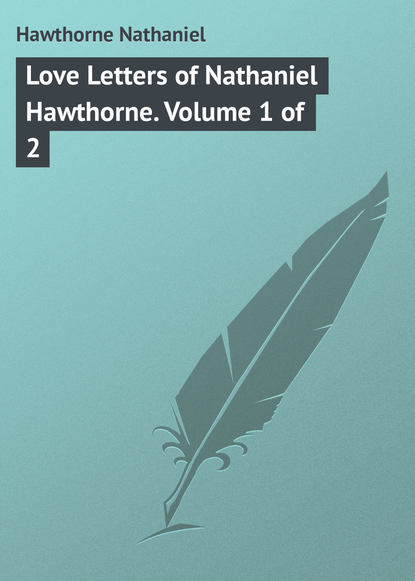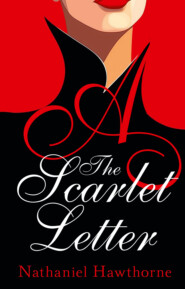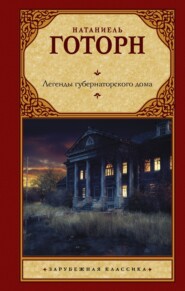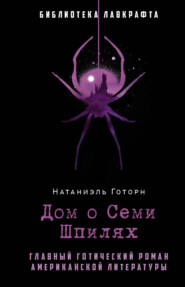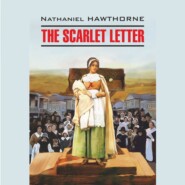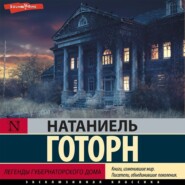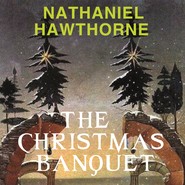По всем вопросам обращайтесь на: info@litportal.ru
(©) 2003-2025.
✖
Love Letters of Nathaniel Hawthorne. Volume 1 of 2
Автор
Год написания книги
2017
Настройки чтения
Размер шрифта
Высота строк
Поля
Dearest, thou knowest not how I have yearned for thee. And now there is but one day more of widowhood! Sophie Hawthorne must not expect me any more on Fridays, till the busy season is over. If I can always come on the appointed Saturday, it will be a great mercy of Heaven; but I trust in Heaven's goodness, and the instrumentality of Colonel Hall. Now God bless thee, ownest wife. God bless us.
To Miss Sophia A. Peabody,
Care of Dr. N. Peabody,
Salem, Mass.
TO MISS PEABODY
Boston, May 15th, 1840.
Darlingest,
I did not reach home last night till candle-light, and then I was beyond expression weary and spiritless; and I could as soon have climbed into Heaven without a ladder, as to come to see thee at Mrs. Park's. So, instead of dressing to pay a visit, I undressed and went to bed; but yet I doubt whether I ought not to have gone, for I was restless and wakeful a great part of the night; and it seemed as if I had scarcely fallen asleep, when I awoke with a start, and saw the gray dawn creeping over the roofs of the houses. So then it was necessary for thy poor husband to leave his pillow, without enjoying that half-dreaming interval which I so delight to devote to thee. However the fresh morning air made a new creature of me; and all day I have felt tolerably lively and cheerful – as much so as is anywise consistent with this intolerable position of near distance, or distant nearness, in which we now find ourselves. Truly Providence does not seem to have smiled on this visit of thine, my dearest. The dispensation is somewhat hard to bear. There is a weight and a gnawing at my heart; but, belovedest, do let thy heart be cheerful, for thy husband's sake.
Very reviving to me was thy letter, mine ownest. Colonel Hall brought it at noon to the eating-house where we had agreed to dine together; and I forthwith opened it and read it while my beefsteak was broiling. It refreshed me much more than my dinner – which is a great deal for a hungry man to say. Dearest, I am in admirable health; it is not the nature of my present mode of life to make me sick; and my nightly weariness does not betoken anything of that kind. Each day, it is true, exhausts all the life and animation that there is in me; but each night restores as much as will be required for the expenditure of the next day. I think this week has been about as tough as any that I ever experienced. I feel the burthen of such constant occupation the more sensibly, from having had so many idle intervals of late.
Oh, dearest, do not thou tire thyself to death. Whenever thou feelest weary, then oughtest thou to glide away from all the world; and go to sleep with the thought of thy husband in thy heart. Why do not people know better what is requisite for a Dove, than thus to keep her wings fluttering all day long, never allowing her a moment to fold them in peace and quietness? I am anxious for thee, mine ownest wife. When I have the sole charge of thee, these things shall not be.
Belovedest, didst thou not bless this shower? It caused thy husband's labors to cease for the day, though it confined him in the cabin of the salt-ship till it was over; but when the drops came few and far between, I journeyed hither to our parlor, and began this scribble. Really I did not think my ideas would be alert enough to write half so much; but I have scrawled one line after another; and now I feel much revived, and soothed and cheered in mind. I shall sleep the more quietly, sweetest wife, for having had this talk with thee – thou wilt bless my sleep. I wish that thou couldst receive this letter to-night, because I am sure thou needest it.
Let me know, mine ownest, what time thou intendest to go to Salem; and if it be possible, I will come to the Depot to see thee. But do not expect me too fervently, because there are many chances that it will not be in my power. What a time this has been for my Dove and me! Never, since we were married, have the fates been so perverse. And now farewell, my dearest, dearest wife, on whom I repose, in whom I am blest – whom I love with all the heart that is in me, and will love more and more forever, as I grow more worthy to love thee. Be happy, dearest; for my happiness must come through thee.
God bless thee, and let me feel his blessing through thy heart.
Thy lovingest husband —
de l'Aubepine.
TO MISS PEABODY
Boston, May 19th, 1840
My dearest,
Where in the world art thou? – or hast thou flown away to Paradise, naughtiest Dove, without bidding thy husband farewell? I know not whereabout this letter will find thee; but I throw it upon the winds in the confidence that some breeze of Heaven will bear it to thee; for I suppose heart never spoke to heart, without being heard, and sooner or later finding a response. Perhaps some hearts that speak to other hearts here on earth may find no response till they have passed far into Eternity; but our hearts catch each other's whispers even here. Happy we! But, belovedest, how is it that thou hast sent me no token of thy existence, since we parted on the Hoopers' doorstep, when thou didst press my hand without a word? It seems an age since then. Thou saidst, on Sunday, that thou shouldst probably return to Salem to-day; but surely thou hast not gone. I feel lonely and not cheerful – my spirit knows not whereabout to seek thee, and so it shivers as if there were no Thou at all – as if my Dove had been only a dream and a vision, and now had vanished into unreality and nothingness.
But tomorrow I shall surely hear from thee: and even should it be otherwise, I shall yet know, with everlasting faith, that my Dove's heart has been trying to make me sensible of its embraces all this time. My dearest, was not that a sweet time – that Sabbath afternoon and eve? But why didst thou look up in my face, as we walked, and ask why I was so grave? If I was grave I know no cause for it, beloved. Lights and shadows are continually flitting across my inward sky, and I know neither whence they come nor whither they go; nor do I inquire too closely into them. It is dangerous to look too minutely at such phenomena. It is apt to create a substance, where at first there was a mere shadow. If at any time, dearest wife, there should seem – though to me there never does – but if there should ever seem to be an expression unintelligible from one of our souls to another, we will not strive to interpret it into earthly language, but wait for the soul to make itself understood; and were we to wait a thousand years, we need deem it no more time than we can spare. I speak only in reference to such dim and intangible matters as that which suggested this passage of my letter. It is not that I have any love for mystery; but because I abhor it – and because I have felt, a thousand times, that words may be a thick and darksome veil of mystery between the soul and the truth which it seeks. Wretched were we, indeed, if we had no better means of communicating ourselves, no fairer garb in which to array our essential selves, than these poor rags and tatters of Babel. Yet words are not without their use, even for purposes of explanation, – but merely for explaining outward acts, and all sorts of external things, leaving the soul's life and action to explain itself in its own way.
My belovedest, what a misty disquisition have I scribbled! I would not read it over for sixpence. Think not that I supposed it necessary to sermonize thee so; but the sermon created itself from sentence to sentence; and being written, thou knowest that it belongs to thee, and I have no right to keep it back. Dearest, I was up very early this morning, and have had a good deal to do, especially this afternoon. Let me plead this excuse for my dulness and mistiness. I suspect that, hereafter, my little Dove will know how to estimate the difficulty of pouring one's self out in a soul-written letter, amid the distractions of business and society – she herself having experienced these checks upon her outpourings.
Now good bye, mine ownest wife. God bless us both – or may God bless either of us, and that one will bless the other. Dost thou sleep well now-a-nights, belovedest? Of whom dost thou dream? Thy husband's long days and short nights hardly leave him time to dream.
Thine Ownest.
Dearest, just as I was folding this letter, came thy note. Do thou be at the Depot as soon as possible after eleven; and I will move Heaven and earth to meet thee there. Perhaps a little before eleven.
Miss Sophia A. Peabody,
South Street.
TO MISS PEABODY
Boston, May 29th, 1840. – 6 P.M.
My dearest,
Rejoice with thy husband, for he is free from a load of coal, which has been pressing upon his shoulders throughout all this hot weather. I am convinced that Christian's burthen consisted of coal; and no wonder he felt so much relieved when it fell off and rolled into the sepulchre. His load, however, at the utmost, could not have been more than a few bushels; whereas mine was exactly one hundred and thirty-five chaldrons and seven tubs… Oh, my dearest, I feel the stroke upon mine own head. Except through thee, I can never feel any torment of that nature; for all these burning suns have blazed upon my head, unprotected except by a black hat, and yet I have felt no more inconvenience than if I had been sitting in the pleasant gloom of a dewy grot. Belovedest, be a great deal more careful of thyself. Remember always that thou art not thine own, but that Providence has entrusted to thy keeping a most delicate physical frame, which belongs wholly to me, and which therefore thou must keep with infinitely more care than thou wouldst the most precious jewel. And yet, I would not have thee anxious and watchful like an invalid; but thou shouldst consider that thou wert created to dwell nowhere but in the clime of Paradise, and wast only placed upon this earth, because thy husband is here and cannot do without thee – and that east-winds and fierce suns are evil unknown in thy native region, and therefore thy frame was not so constructed as to resist them; wherefore thine own wise precautions must be thy safeguard. Blessedest, I kiss thy brow, – at least, I kiss the air thrice; and if none of the three kisses reach thee, then three very precious things will have gone forth from my heart in vain. But if any of thy headache and bewilderment have remained hitherto, and now thou feelest somewhat like a breath of Heaven on thy brow, we will take it for granted that my kisses have found thee out. Good bye now, dearest wife; for I am weary and stupid; and as I need not be at the Custom-House before eight or nine o'clock tomorrow, thou shalt have the rest of the letter freshly written in the morning.
Now it will be lucky for thee if thou gettest the last page of this letter entirely full. Dearest, thy last letter had the fragrance of a bank of violets – yea, all sorts of sweet smelling flowers and perfumed shrubs. I can lie down and repose upon it, as upon a bed of roses. It rejoices me to think that my whole being is not enveloped with coal-dust, but that its better half is breathing the breath of flowers. Oh, do be very happy, mine ownest wife, and fill thyself with all gentle pleasures that lie within thy reach; because at present thou hast a double duty to perform in this respect; since, so far as my enjoyments depend on external things, I can contribute nothing to the common stock of happiness. And yet dearest, nothing that I ever enjoyed before can come into the remotest comparison with my continual enjoyment of thy love – with the deep, satisfied repose which that consciousness brings to me; a repose subsisting, and ever to subsist, in the midst of all anxieties, troubles and agitations.
Belovedest, I sometimes wish that thou couldst be with [me] on board my salt-vessels and colliers; because there are many things of which thou mightst make such pretty descriptions; and in future years, when thy husband is again busy at the loom of fiction, he would weave in these little pictures. My fancy is rendered so torpid by my ungenial way of life, that I cannot sketch off the scenes and portraits that interest me; and I am forced to trust them to my memory, with the hope of recalling them at some more favorable period. For three or four days past, I have been observing a little Mediterranean boy, from Malaga, not more than ten or eleven years old, but who is already a citizen of the world, and seems to be just as gay and contented on the deck of a Yankee coal-vessel, as he could be while playing beside his mother's door. It is really touching to see how free and happy he is – how the little fellow takes this whole wide world for his home, and all mankind for his family. He talks Spanish – at least, that is his native tongue; but he is also very intelligible in English, and perhaps he likewise has smatterings of the speech of other countries, whither the winds may have wafted this little sea-bird. He is a Catholic; and yesterday, being Friday, he caught some fish and fried them for his dinner, in sweet oil; and really they looked so delicate that I almost wished he would invite me to partake. Every once in a while, he undresses himself and leaps overboard, plunging down beneath the waves, as if the sea were as native to him as the earth; then he runs up the rigging of the vessel, as if he meant to fly away through the air. Do thou remember this little boy, dearest, and tell me of him one of these days; and perhaps I may make something more beautiful of him than thou wouldst think from these rough and imperfect touches.
Belovedest, is thy head quite well? Art thou very beautiful now? Dost thou love me infinitely?
Miss Sophia A. Peabody,
Care of Dr. N. Peabody,
Salem, Mass.
TO MISS PEABODY
Boston, June 2d, 1840 – Before Breakfast
My dearest,
Thy Friday's letter came in due season to the Custom-House; but Colonel Hall could not find time to bring it to the remote region of the earth, where I was then an exile; so that it awaited me till the next morning. At noon, came thy next letter, at an interval of several hours from the receipt of the former – a space quite long enough to be interposed between thy missives. And yesterday arrived thy letter of the Sabbath – and all three are very precious to thy husband; and the oftener they come the more he needs them. Now I must go down to breakfast. Dost thou not wonder at finding me scribbling between seven and eight o'clock in the morning? I do believe, naughtiest, that thou hast been praying for the non-arrival of salt and coal – not considering that, if thy petitions are heard, the poor Measurers will not earn a sixpence.
Belovedest, I know not what counsel to give thee about calling on my sisters; and therefore must leave the matter to thine own exquisite sense of what is right and delicate. We will talk it over at an early opportunity. I think I can partly understand why they appear cool towards thee; but it is for nothing in thyself personally, nor for any unkindness towards my Dove, whom everybody must feel to be the loveablest being in the world. But there are some untoward circumstances. Nevertheless, I have faith that all will be well, and that they will receive Sophie Hawthorne and the Dove into their heart of hearts; so let us wait patiently on Providence, as we always have, and see what time will bring forth. And, my dearest, whenever thou feelest disquieted about things of this sort – if ever that be the case – do thou speak freely to thy husband; for these are matters in which words may be of use, because they concern the relations between ourselves and others. Now, good bye, belovedest, till night. I perceive that the sun is shining dimly; but I fear that there is still an east wind to keep my Dove in her dove-cote.
Towards night – Ownest wife, the day has been spent without much pleasure or profit – a part of the time at the Custom-House, waiting there for the chance of work, – partly at the Athenaeum, and partly at a bookstore, looking for something suitable for our library. Among other recent purchases, I have bought a very good edition of Milton (his poetry) in two octavo volumes; and I saw a huge new London volume of his prose works, but it seemed to me that there was but a small portion of it that thou and I should ever care about reading – so I left it on the shelf. Dearest, I have bought some lithographic prints at auction, which I mean to send thee, that thou mayst show them to thy husband, the next afternoon that thou permittest him to spend with thee. Thou art not to expect anything very splendid; for I did not enter the auction-room till a large part of the collection was sold; so that my choice was limited. Perhaps there are one or two not altogether unworthy to be put on the walls of our sanctuary; but this I leave to thy finer judgment. I would thou couldst peep into my room and see thine own pictures, from which I have removed the black veils; and there is no telling how much brighter and cheerfuller the parlor looks now, whenever I enter it.
Belovedest, I love thee very especially much today. But then that naughty Sophie Hawthorne – it would be out of the question to treat her with tenderness. Nothing shall she get from me, at my next visit, save a kiss upon her nose; and I should not wonder it she were to return the favor with a buffet upon my ear. Mine own Dove, how unhappy art thou to be linked with such a mate! – to be bound up in the same volume with her! – and me unhappy, too, to be forced to keep such a turbulent little rebel in my inmost heart! Dost thou not think she might be persuaded to withdraw herself, quietly, and take up her residence somewhere else? Oh, what an idea! It makes my heart close its valves and embrace her the more closely.
Well, dearest, it is breakfast time, and thy husband hath an appetite. What dost thou eat for breakfast? – but I know well enough that thou never eatest anything but bread and milk and chickens. Dost thou love pigeons in a pie? I am fonder of Dove than anything else – it is my heart's food and sole sustenance. God bless us.
Thine Own Husband.
TO MISS PEABODY
Boston, June 11th, 1840 – 5 or 6 P.M.
My blessedest,
Thou hast strayed quite out of the sphere of my imagination, and I know not how to represent thy whereabout, any more than if thou hadst gone on pilgrimage beyond the sea, or to the moon. Dost thou still love me, in all thy wanderings? Are there any east-winds there? Truly, now that thou hast escaped beyond its jurisdiction, I could wish that the east wind would blow every day, from ten o'clock till five; for there is great refreshment in it for us poor mortals that toil beneath the sun. Dearest, thou must not think too unkindly even of the east-wind. It is not, perhaps, a wind to be loved, even in its benignest moods; but there are seasons when I delight to feel its breath upon my cheek, though it be never advisable to throw open my bosom and take it into my heart, as I would its gentle sisters of the South and West. To-day, if I had been on the wharves, the slight chill of an east wind would have been a blessing, like the chill of death to a world-weary man. But, dearest, thou wilt rejoice to hear that this has been one of the very idlest days that I ever spent in Boston. Oh, hadst thou been here! In the morning, soon after breakfast, I went to the Athenaeum Gallery; and during the hour or two that I stayed, not a single visitor came in. Some people were putting up paintings in one division of the room; but we might have had the other all to ourselves – thy husband had it all to himself – or rather, he did not have it, nor possess it in fulness and reality, because thou wast not there. I cannot see pictures without thee; so thou must not expect me to criticise this exhibition. There are two pictures there by our friend (thy friend – and is it not the same thing?) Sarah Clark – scenes in Kentucky. Doubtless I shall find them very admirable, when we have looked at them together. The gallery of sculpture I shall not visit, unless I can be there with thee.
From the picture gallery I went to the reading-room of the Athenaeum, and there read the magazines till nearly twelve – thence to the Custom-House, and soon afterwards to dinner with Colonel Hall – then back to the Custom-House, but only for a little while. There was nothing in the world to do, and so, at two o'clock, I came home and lay down on the bed, with the Faery Queen in my hand, and my Dove in my heart. Soon a pleasant slumber came over me; it was not a deep, sound sleep, but a slumbrous withdrawing of myself from the external world. Whether thou camest to me in a dream, I cannot tell; but thou didst peep at me through all the interstices of sleep. After I awoke, I did not take up the Faery Queen again, but lay thinking of thee, and at last bestirred myself and got up to write this letter. My belovedest wife, does it not make thee happy to think that thy husband has escaped, for one whole summer day, from his burthen of salt and coal, and has been almost as idle as ever his idle nature could desire? – and this, too, on one of the longest days of all the year! Oh, could I have spent it in some shady nook, with mine own wife! Now good-bye, blessedest. So indolent is thy husband, that he intends now to relieve himself even from the sweet toil of shaping his thoughts of thee into written words; moreover, there is no present need of it, because I am not to be at the Custom-House very early, and can finish this letter tomorrow morning. Good-bye, dearest, and keep a quiet heart.





